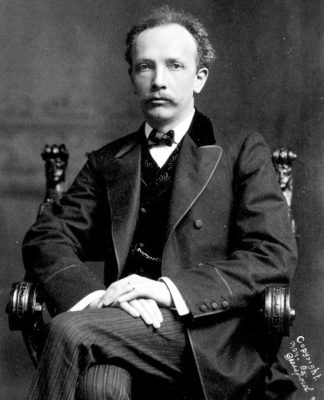RICHARD STRAUSS, THIS WILY FRENCHMAN
Who doesn’t know Richard Strauss, the quintessence of Germanic music, the apex and end of Romantic music? In the 20th century, this giant is to German opera what Puccini is to Italian opera, and his "Salomé", written at the age of 41 and premiered in 1905, far surpasses (and by a long shot, in my opinion) the "official" modernists, such as the representatives of the Second Viennese School: Arnold Schoenberg, Anton Webern, and Alban Berg.
But it is precisely in this work, which caused a scandal upon its premiere, just like the eponymous play by Oscar Wilde that inspired it, that Strauss reveals himself to be more French than is usually thought, and this in three ways.
First of all, Wilde’s play is written in French, and from 1904 to 1905 Strauss worked on two versions of his work— the famous one, played everywhere, which is in German (a very literal translation by Hedwig Lachmann, based on which the composer wrote his libretto), but also a version directly in French, which was premiered in Brussels in 1907!
Why write in French? In Strauss’s time, the musical world, especially opera, was dominated by the unavoidable figure of Richard Wagner. Strauss even worked in Bayreuth, first as an assistant, then as second conductor, and later as a vocal conductor.
How could one break free from Wagner’s influence? This was a real issue for French music in particular, with the 1870 episode creating a true moral dilemma for French composers at a time when being patriotic didn’t automatically consign an artist to exile.
"We must de-Wagnerize!" said Debussy, and for him, as well as for Ravel, the path to salvation would be more or less directly pointed out by the Russians, and in particular, by the powerfully original works of Mussorgsky.
And what about Strauss? In the opera "Feuersnot", which precedes "Salomé", Strauss resolves his issue with Wagner by symbolically killing the father. Indeed, in this work, Strauss demonstrates his mastery of Wagnerian vocabulary by dazzlingly parodying "Die Meistersinger", "Tristan und Isolde", and "Parsifal".
But killing the father is not enough to enter the musical pantheon – one must also create.
The French de-Wagnerized themselves through Russian music, so Strauss would de-Wagnerize himself through French.
"Salomé" is precisely Strauss’s musical baptismal certificate, and it is therefore written… first in French.
Language, the first element of Strauss’s Frenchification.
The second is the orchestra. Here too, Wagner left a mark with his grandeur, innovation, immense orchestral layers, and the "augmented" orchestra with new instruments specifically designed for him, including the Wagner tubas, powerful brass instruments.
Strauss would also use Wagner tubas in three of his later operas, and he remained faithful to Wagner’s spirit by using in "Salomé" a brand-new instrument, the heckelphone (a type of bass oboe), invented only a year before "Salomé" was created. However, his conception of the orchestra is quite different from Wagner's. Here’s what he wrote to Romain Rolland: "I have undoubtedly learned more than you think from French music, from the delicacy and crystalline clarity of a score by Bizet or Berlioz: if you carefully follow my orchestral style, this study cannot escape you."
Thus, by his own admission, here is another French affiliation of Richard Strauss, and not the least, for the orchestra is, for him, the central place of narrative and musical fulfillment.
Finally, the third emblem of Strauss’s Frenchness in "Salomé" is the spirit. Strauss writes to Romain Rolland that "when it’s religious, I don’t like it." Strauss’s irreverent spirit goes far in subverting codes and symbols, as he treats the rigid, prophetic figure of Jokanaan (John the Baptist) with no sympathy, opposing him to the stunning sensuality of Salomé.
For example, Strauss uses the organ in the orchestra. What instrument could be more appropriate to characterize a prophet? Yet, Strauss introduces the organ only at the very end of the opera, when Jokanaan is already dead, at the precise moment when Salomé kisses the mouth of Jokanaan, whose head she holds in her hands. From the liturgical instrument, the organ here becomes an "instrument of the kiss." Another inversion, and salvation through Eros (though Thanatos will win, as Salomé will be crushed by Herod’s soldiers’ shields) – this famous final scene of the kiss, full of eroticism and taboos, is based precisely on the theme of the Redeemer’s announcement uttered by Jokanaan! Wilde had conceived his play for the famous French actress Sarah Bernhardt, and this celebration of feminine sensuality, the breaking of codes, the freedom of musical language (a French critic in "Le Gaulois" in 1907 spoke of the "audacity of the breaker of tonality and rhythm" regarding Strauss) marks this movement of liberation, which doesn’t exclude irony despite the drama, nor a kind of light fluidity. These are traits opposite to Wagner’s sense of the sacred, the German seriousness—traits typical of the French spirit, especially in 1905, the year "Salomé" premiered, which was also the year of the separation of Church and State in France.
Through the text, the orchestra, and the spirit, Richard Strauss can thus be considered, in "Salomé", a wily Frenchman.


